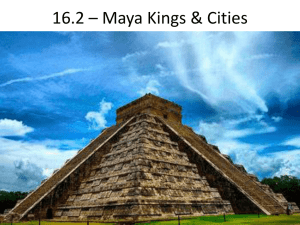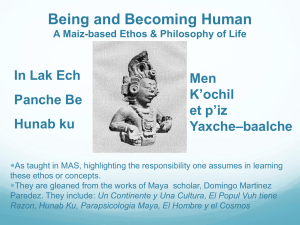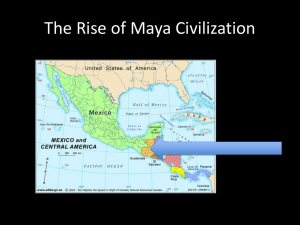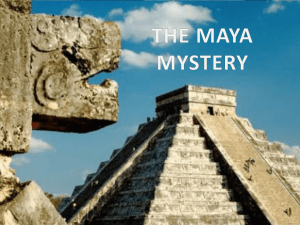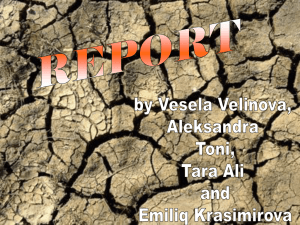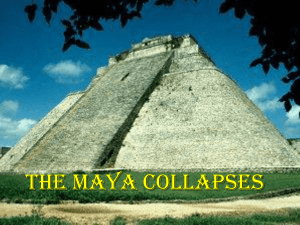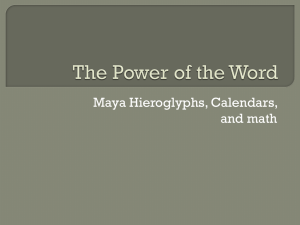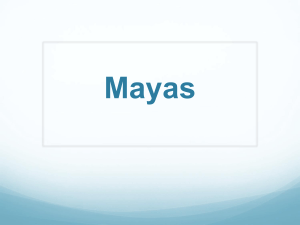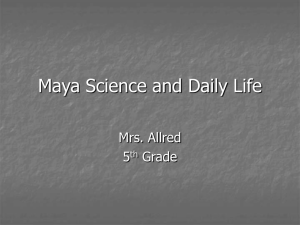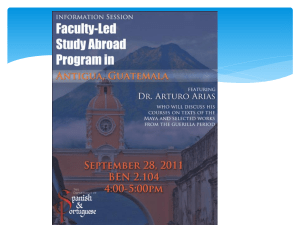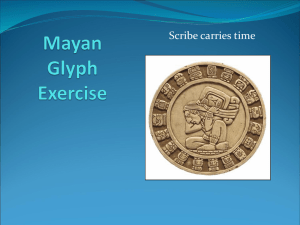k`ochil - LEAD Summit
advertisement
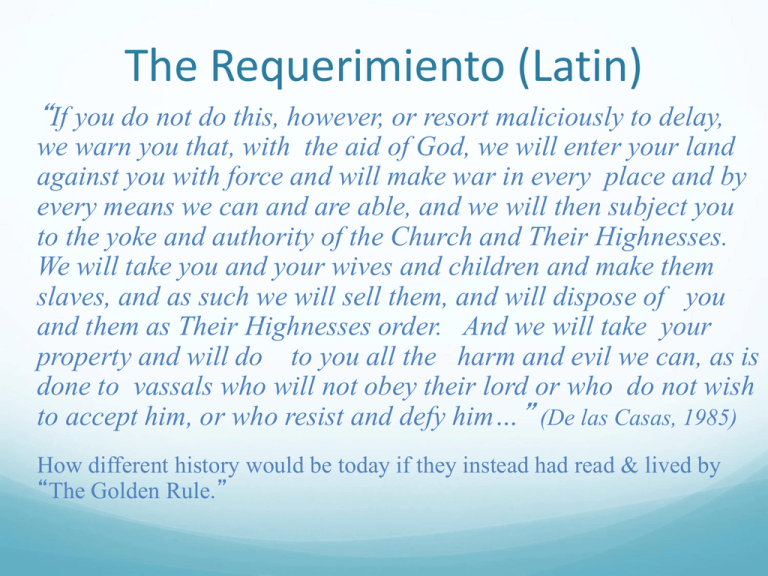
The Requerimiento (Latin) “If you do not do this, however, or resort maliciously to delay, we warn you that, with the aid of God, we will enter your land against you with force and will make war in every place and by every means we can and are able, and we will then subject you to the yoke and authority of the Church and Their Highnesses. We will take you and your wives and children and make them slaves, and as such we will sell them, and will dispose of you and them as Their Highnesses order. And we will take your property and will do to you all the harm and evil we can, as is done to vassals who will not obey their lord or who do not wish to accept him, or who resist and defy him…” (De las Casas, 1985) How different history would be today if they instead had read & lived by “The Golden Rule.” RELATIONSHIPS While the three concepts explain the function of the universe, perhaps more important is how people relate to each other and all life and how people treat each other as human beings. It should not actually matter from what tradition these or similar concepts come from, but rather, whether they are lived, as opposed to simply spoken about. In Lak Ech – Panche Be - Hunab Ku Synthesis The essence of In Lak Ech-Tu Eres mi Otro Yo is Hunab Ku. But Hunab Ku is the Great Mystery. To understand it is a lifelong pursuit. Panche Be can guide people on that journey, yet, Panche Be, without In Lak Ech will lead to arrogance. And to know Hunab Ku without In Lak Ech is useless. All 3 concepts lead to the creation of good human beings. And the three belong to all of humanity. Result: Humans as part of Creation – not severed from it Memory-Memoria Missing from the above re what it means to be human Memory-Memoria [Creation] Original Stories-Narratives (Original Instructions) Where we Come from How We Got Here What we are made of Who we Are What we live for Nahuatl Thought: Tezcatlipoca: The Smoking Mirror = memory Amoxtli Chimalpopoca Codex Nahua Creation Story The Legend of the Suns The Ants of Quetzalcoatl Part I & II Creation of Human Beings in Tamoanchan How maiz came to the people Quetzalcoatl, the Ants & The Gift of Maiz Maiz, the path of the Ants & Our New Sun All peoples/cultures have such stories Creation of The Cosmos Creation of maiz in Tamuanchan Creation of the world Creation of human beings mud, wood - maiz San Bartolo murals – Nakbe – El Mirador Documented 2200 years–oral tradition ‘men’ Creer – imagine (believe) Crear - Create Hacer – Do (carry out) men To imagine, believe in, and the creation of our own reality. “It’s a power within our psyche.” Part of our will. (Parasicologia Maya p. 68-69) In 1990s, a few students/community members imagined Raza Studies for TUSD School Board created Hispanic Studies in 1997 Educators changed it to Raza Studies Became most successful: k-12 Raza Studies program in nation Maiz-based philosophy-social justice emphasis Raza Studies teacher training summer institute imagined it, believed it, created it, shaped it K’ochil k’ochil: educacion con verdadero sentido de responsibilidad (Parasicologia Maya, p17) K’ochil: education with a true sense of responsibility (Parasicologia Maya, p17) the essence of MAS–TUSD & struggle to defend it, spread it nationwide. Not an option, but responsibility k’ochil; carga con la cual se nace y se muere, sin que nada ni nadie pueda redimir de tal responsibilidad de sus actos, y no hay que olvidar aquello de que la consciencia es fiscal y juez tampoco lo de ‘con la vara que mides seras medido…’ one is born with and dies with this responsibility. Nothing or no one is able to shirk from it. We cannot forget that our conscience is just and prudent: “By the ruler we measure, we too will be measured.” k’ochil parte de personalidad filosofica y espiritual; reflejo de esa Energia Inteligente. This carga or responsibility makes up our philosophical and spiritual personality; a reflection of that intelligent energy. K’ochil Perhaps this is the reason why people who fight for, and struggle for, human rights, say they are compelled to do so. That it is a duty. A sacrifice Not a choice, but a responsibility. Appears to be the approximate meaning of K’ochil et p’iz ley de compensacion y responsabilidad. The law of compensation and responsibility: Cause-and-effect. ( streets: what comes around goes around) Our measure; they would say that whatever good or bad a person received depended upon how each person conducted himself or herself. Parasicolgia Maya, p42 et p’iz No one escapes this law. Each person is responsible for how one thinks, says and does. This is one of most important ethics. It is applicable in life, but also in political battles (MAS-TUSD) Yaxche – Baalche el arbol es el Ser humano; el ser humano es el arbol; The tree is the human being: the human being is the tree. Filosofia-philosophy; without vegetation, there are no humans & no life. Ecological concept (Parapsicologia Maya,p79) Yaxche – baalche ‘el pensador maya considera primero el arbol Yaxche y despues al animal con la expression baalche; animal, porque sin vegetales no habrian animales, y asi llegaron a sentenciar que: muerto el ultimo arbol, muerto el ultimo hombre [ser humano].’ Parasicologia Maya, P141 Yaxche – Baalche ‘The Maya thinker thinks first of the tree (yaxche) and then the animal with the expression baalche, because without vegetation there would be no animals. That’s how they determined that: the death of the last tree signifies the death of the last human being.’ (Parasicologia Maya, P141. ) Yaxche – Baalche interdependancy The tree is the ultimate symbol of life & of creation ‘Ese arbol es el arbol de la vida.’ Represents vegetation If vegetation is destroyed, humans cannot exist Understand that relationship between humans & their environment & all life [forms] Ecological balance and interdependency for the next 7 generations Synopsis ‘The responsibility that we are born with and we die with (K’ochil) and that is maintained by the law of compensation called et p’iz, our measure which determines that according to how a person lives, good or bad and that yesterday's error will be paid today and today's error will be paid tomorrow.” For the Maya mistake turns into a debt. ‘This leads to the philosophy of in lak ech. You are me and I am you.’ That is why the philosophy is that you can receive good and bad. (Parasicologia Maya, p94) A challenge What responsibility does the MAS community have in adopting these maiz-based values? One can learn them or one can live them… in the present. Human rights/Indigenous rights ethos Adopt a social justice & adopt a human rights ethos and human rights language: UN/OAS See ‘Outlaw Arizona’ Understand relationship to continent & to the peoples of Abya Yalla. Understand Doctrine of Discovery & the 2007 UN Declaration on the Rights of Indigenous Peoples Responsibility of these ethos These thoughts were gifted by elders, who established relationships in the U.S., including: Domingo Martinez Paredez, Florencio YescasMaestra Angelbertha Cobb, Andres Segura and Tlakaele. There is a danger of romanticizing, viewing them through a historical, as opposed to, contemporary lens. Those who adopt them, must accept the responsibility of finding their own relationship to continent & its original peoples and positioning themselves relative to the indigenous rights [liberation] movements of this continent. A Teaching Opportunity Climate permits teaching other maiz–based knowledge, including Aztec calendar, Popul Vuh, codices & chronicles. In Tucson, this is considered outside of W. Civilization. MAS teacher Norma Gonzalez told she can’t teach Aztec Calendar because it is Mexican history/culture. Horne says she can. 100% of homes have it. 99.9% don’t know how to read it Raza Contribution [Lo] Rasquachi (La Chicanada) Brown Power/Brown is Beautiful Si se Puede (Dolores Huerta UFW) Sin Fronteras: We Didn’t Cross the Borders; The borders crossed us! UNITY HAND CLAP Xicanisma (ChicanismoChicanismo) Ningun Ser Humano es Ilegal (Bert Corona 1960s) We Will not Comply! Con/Safos Being & Becoming Human A Maiz-based Ethos & Philosophy of Life Roberto Dr. Cintli Rodriguez, Asst. Prof MAS - University of Arizona 520-271-6796 rodrigu7@email.arizona.edu
